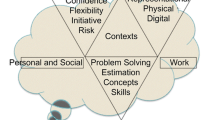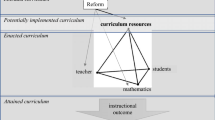Abstract
This article describes a summer enrichment science, technology, engineering, and mathematics (STEM) camp for African-American girls and young women aimed at addressing mathematical and science self-efficacy and reinforcing the importance and usefulness of mathematics and science with a socially transformative curriculum. The research questions guiding this study are (1) How do African-American girl participants describe their experiences in Girls STEM Institute (GSI)? and (2) How does the STEM program experience affect their mathematics and science self-efficacy and valuing of mathematics and science? The data, which included journal entries and interviews, were collected and analyzed from four participants and indicated that participating in the Girls STEM Institute led to improved mathematics and science self-efficacy and increased perceptions of the value of science and math knowledge.
Similar content being viewed by others
References
Aguirre, J., Mayfield-Ingram, K., & Martin, D. (2013). The impact of identity in K–8 Mathematics: Rethinking equity-based practices. Reston: National Council of Teachers of Mathematics.
Afterschool Alliance (2011). STEM learning in afterschool: An analysis of impact and outcomes. http://www.afterschoolalliance.org/STEM-Afterschool-Outcomes.pdf.
Bandura, A. (1986). Social foundations of thought and action: A social cognitive theory. Prentice-Hall.
Britner, S. L., & Pajares, F. (2006). Sources of science self-efficacy beliefs of middle school students. Journal of Research in Science Teaching, 43, 485–499. https://doi.org/10.1002/tea.20131
Brophy, J. (1999). Toward a model of the value aspects of motivation in education: Developing appreciation for particular learning domains and activities. Educational Psychologist, 34, 75–85. https://doi.org/10.1207/s15326985ep3402_1
Eccles, J., Adler, T., Futterman, R., Goff, S., Kaczala, C., & Meece, J. (1983). Expectancies, values and academic behaviors. In J. T. Spence (Ed.), Achievement and achievement motives (pp. 75–146). Freeman.
Eccles, J. S., & Wigfield, A. (2002). Motivational beliefs, values, and goals. Annual Review of Psychology, 53, 109–132. https://doi.org/10.1146/annurev.psych.53.100901.135153
Else-Quest, N. C., Concetta, M., & Higgins, A. (2013). Math and science attitudes and achievement at the intersection of gender and ethnicity. Psychology of Women Quarterly, 37(3), 293–309. https://doi.org/10.1177/0361684313480694
Evans-Winters, V., & Esposito, J. (2010). Other people’s daughters: Critical race feminism and black girl’s education. Educational Foundation, 24(1/2), 11–24.
Evan-Winters, V. (2011). Teaching black girls: Resiliency in urban classrooms. Peter Lang Publishing.
Foley, J. A., Morris, D., Gounari, P., & Agostinone-Wilson, F. (2015). Critical education, critical pedagogies, marxist education in the united states. Journal for Critical Education Policy Studies, 13(3), 110–144.
Hulleman, C., Godes, O., Hendricks, B., & Harackiewicz, J. (2010). Enhancing interest and performance with a utility value intervention. Journal of Educational Psychology. https://doi.org/10.1037/a0019506
Joseph, N., Viesca, K., & Bianco, M. (2016). Black female adolescents and racism in schools: Experiences in a colorblind society. The High School Journal, 100, 4–25. https://doi.org/10.1353/hsj.2016.0018
King, N. S., & Pringle, R. M. (2019). Black girls speak STEM: Counterstories of informal and formal learning experiences. Journal of Research in Science Teaching, 56(5), 539–569. https://doi.org/10.1002/tea.21513
Lewis, B., & Connell, S. (2005). African American students’ career considerations and reasons for enrolling in advanced science courses. Negro Educational Review, 56(2&3), 221–231.
Luttrell, V., Callen, B., Allen, C., Wood, M., Deeds, D., & Richard, D. (2010). The mathematics value inventory for general education students: Development and initial validation. Educational and Psychological Measurement, 70(1), 142–160. https://doi.org/10.1177/0013164409344526
Malloy, C. E. (1997). Including African American students in the mathematics community. In J. T. M. J. Kenney (Ed.), Multicultural and gender equity in the mathematics classroom: The gift of diversity (pp. 23–33). National Council of Teachers of Mathematics.
Malloy, C. (2008). Looking throughout the world for democratic access to mathematics. In L. English (Ed.), Handbook of international research in mathematics (pp. 17–25). Erlbaum.
Martin, D. (2000). Mathematics success and failure among African American youth: The roles of sociohistorical context, community forces, school influence, and individual agency. Erlbaum.
Martin, D. (2012). Learning mathematics while Black. Educational Foundations 26, 47–66.
McPherson, E. (2014). Informal learning in science, math, and engineering majors for African American female undergraduates. Global Education Review, 1(4), 96–113.
Meece, J., Wigfield, A., & Eccles, J. (1990). Predictors of math anxiety and its consequences for young adolescents’ course enrollment intentions and performances in mathematics. Journal of Educational Psychology, 82, 60–70. https://doi.org/10.1037/0022-0663.82.1.60
Morris, E. (2007). ‘Ladies’ or ‘Loudies’? perceptions and experiences of black girls in classrooms. Youth and Society, 38(4), 490–515. https://doi.org/10.1177/0044118X06296778
Morton, C. H., & Smith-Mutegi, D. (2018). Girls STEM Institute: Transforming and empowering black girls in mathematics through STEM. Re-humanizing mathematics for Black, Indigenous, and Latinx students. Annual Perspectives in Mathematics Education, pp. 23–37.
Mutegi, J. W. (2011). The inadequacies of “science for all” and the necessity and nature of a socially transformative curriculum approach for African American science education. Journal of Research in Science Teaching, 48, 301–316. https://doi.org/10.1002/tea.20410
National Women’s Law Center and Girls for Gender Equity (2015). Listening session on the needs of young women of color. https://nwlc.org/resources/what-young-women-of-color-in-nyc-need/.
National Science Foundation, National Center for Science and Engineering Statistics. (2017). Women, minorities, and persons with disabilities in science and engineering: 2017. Special Report NSF 17–310. Arlington, VA. Available at http://www.nsf.gov/statistics/wmpd/.
Neal-Jackson, A. (2018). A meta-ethnographic review of the experiences of African American girls and young women in K-12 education. Review of Educational Research, 88(4), 508–546. https://doi.org/10.3102/0034654318760785
Ryan, R. M., & Powelson, C. L. (1991). Autonomy and relatedness as fundamental to motivation in education. Journal of Experimental Education, 60, 49–56. https://doi.org/10.1080/00220973.1991.10806579
Sahin, A., Ayar, M., & Adiguzel, T. (2014). STEM-related after-school program activities and associated outcomes on student learning. Educational Sciences: Theory & Practice, 14(1), 309–322. https://doi.org/10.12738/estp.2014.1.1876
Simpkins, S., Davis-Kean, P., & Eccels, J. (2006). Math and science motivation: A longitudinal examination of the links between choices and beliefs. Developmental Psychology, 42(1), 70–83. https://doi.org/10.1037/0012-1649.42.1.70
Tate, W., & Rousseau, C. (2002). Access and opportunity: The political and social context of mathematics education. In L. English (Ed.), Handbook of international research in mathematics education (pp. 271–300). Erlbaum.
Tesch, R. (1987). Emerging themes: The researcher’s experience. Phenomenology + Pedagogy, 5, 230–241. https://doi.org/10.29173/pandp15058
Van Manen, M. (1990). Researching lived experiences: Human science for an action sensitive pedagogy. State University of New York.
VanMeter-Adams, A., Frankenfeld, C., Bases, J., Espina, V., & Liotta, L. A. (2014). Students who demonstrate strong talent and interest in STEM are initially attracted to STEM through extracurricular experiences. CBE-Life Sciences Education, 13(4), 687–697. https://doi.org/10.1187/cbe.13-11-0213
Walker, E. (2007). Why aren’t more minorities taking advanced math? Educational Leadership, 65(3), 48–53.
West-Olatunji, C., Shure, L., Pringle, R., Adams, T., Lewis, D., & Cholewa, B. (2010). Exploring how school counselors position low-income African American girls as mathematics and science learners. Professional School Counseling, 13(3), 184–195. https://doi.org/10.5330/PSC.n.2010-13.184
Young, J., Feille, K., & Young, J. (2017). Black girls as learners and doers of science: A single-group summary of elementary science achievement. Electronic Journal of Science Education, 21(2), 1–20.
Yurt, E. (2014). The predictive power of self-efficacy sources for mathematics achievement. Education and Science, 39(176), 159–169.
Author information
Authors and Affiliations
Corresponding author
Additional information
Publisher's Note
Springer Nature remains neutral with regard to jurisdictional claims in published maps and institutional affiliations.
This manuscript is part of the special issue “Science education and the African Diaspora in the United States”, guest edited by Mary M. Atwater and Jomo W. Mutegi.
Rights and permissions
About this article
Cite this article
Morton, C., Smith-Mutegi, D. Making “it” matter: developing African-American girls and young women’s mathematics and science identities through informal STEM learning. Cult Stud of Sci Educ 17, 39–52 (2022). https://doi.org/10.1007/s11422-022-10105-8
Received:
Accepted:
Published:
Issue Date:
DOI: https://doi.org/10.1007/s11422-022-10105-8




